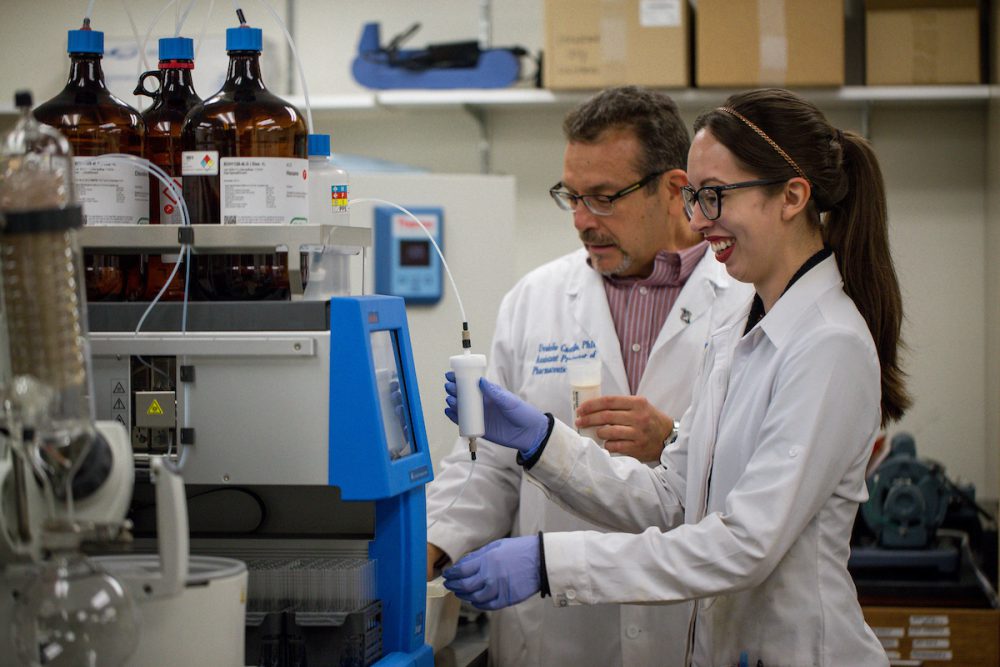
We have many guides in our lives, like our parents, teachers, and coaches, who help us on our journeys. Often, we don’t get to choose who these people are:
- I didn’t pick Calvin Diggs to be my baseball coach at age 13; he drafted me.
- I didn’t pick Frau McDonald as my German teacher; our high school was lucky to even have one.
- None of us get to pick who our parents are; I just lucked out by having two great ones!
By the time you reach graduate school, things look a little bit different. I did get a chance to pick Dr. Andy Coop as my Ph.D. mentor in grad school. I did have the opportunity to work under Dr. Tom Prisinzano as my postdoctoral mentor. These people guided me on my current path as a pharmacy professor.
If you are thinking about a career in pharmacy, you might want to consider partnering with a mentor, too. Here at Concordia University Wisconsin School of Pharmacy, we have lots of faculty who act as mentors.
What does it mean to pick a mentor? What does mentorship look like? How is mentorship different from academic advising? I want to share how I approach the mentorship process.
A little about me
To provide some context about my background, you can delve deeper into my story here. Unlike traditional pharmacists, I lack the training to offer patient counseling, administer medications, or perform most tasks commonly associated with the field.
My expertise lies in my Ph.D. in Pharmaceutical Sciences, which equips me to educate our Pharm.D. candidates on the intricate mechanisms of how drugs operate at a molecular level. This knowledge empowers pharmacists to occupy a unique and vital role within the healthcare system. They possess unparalleled expertise in the actions of drugs, a level of specialization unmatched by any other healthcare professional.
Beyond teaching in the classroom, I also conduct research. Being a research scientist at a school like Concordia, I find myself in the laboratory conducting research alongside pharmacy students. This lets me get to know my mentees on a more personal level. I have been blessed to serve as a mentor to 22 Pharm.D. candidates, 9 M.S. candidates, and 12 undergraduates since I started here in 2011.
Being a mentor
Mentoring a Pharm.D. candidate looks a bit different from being an academic advisor. In my role as a mentor, my responsibilities extend beyond ensuring students’ academic success. I am also tasked with maintaining their motivation throughout their journey toward the successful completion of an independent research project. Though each pharmacy student is paired with an academic advisor on day one, not every student will complete a mentor-guided research project.
When I engage with my academic advisees, I like to act like a “guide”. During our conversations, we discuss their career goals and how I can assist them in achieving those goals.
Benefits of mentoring
Mentoring a student through a research project is rewarding in several ways. First, it is a thrill to discover new things and communicate those discoveries to the scientific community. I have been blessed to have pharmacy students appear as co-authors on 10 peer-reviewed manuscripts and 25 podium and poster presentations. Showing proof of research skills is crucial for pharmacy students seeking a residency or fellowship opportunity.
Sometimes, my mentees do great work and win awards. Five Pharm.D. candidates from my lab have won travel awards to present their research at conferences. Former student, Dr. Andrea Devereaux won a prestigious award from the Female Opioid Research & Clinical Experts (FORCE) Foundation.
Beyond those tangible benefits of entering into a mentor/mentee relationship, there is the added bonus of forming lasting connections with an expanded network of young professionals. Graduates from my laboratory have gone on to work in diverse vocations, including community pharmacies, hospitals, industry, and academia. There are even a couple who are working toward their Ph.D.!
Ultimately, my job as a mentor is to help students on the path to a successful career. Effective mentoring means meeting pharmacy students where they are, asking where they want to go, and mapping out how they might get there.